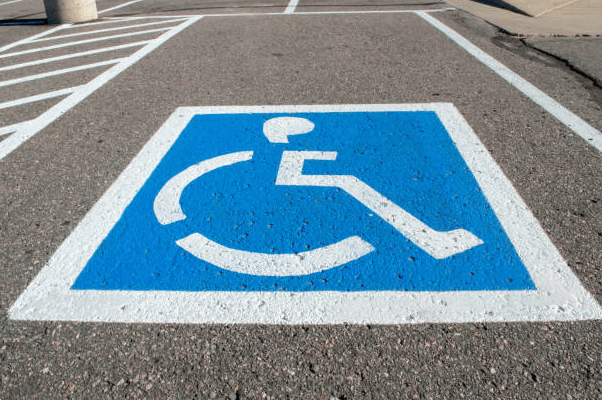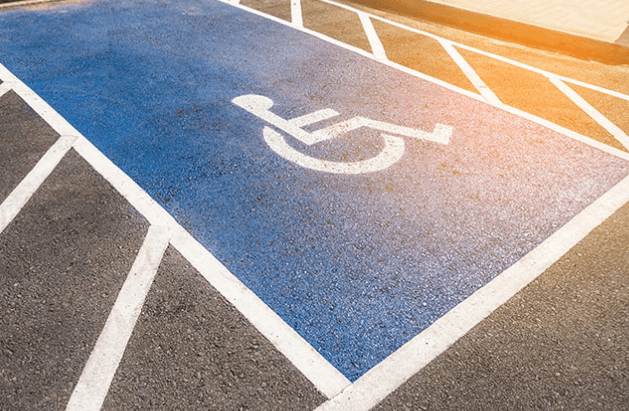Immersed in the labyrinth of legal directives, a robust stance is asserted against the discrimination that persons with disabilities encounter within the realm of parking. The stringency of laws unambiguously proclaim it unlawful to usurp a handicap spot devoid of possessing the necessary permit, thereby safeguarding these spots for those whose need is greatest. These particular parking areas are earmarked specifically for individuals battling disabilities and are strategically positioned near building entrances to facilitate ease of access.
Furthermore, overseeing this handicap park’s regulatory landscape involves an intricate interplay between federal and state legislations. While certain nuances may manifest as variable across states’ guidelines, one tenet stands steadfast: it remains unequivocally illegal for any person lacking the required permit to occupy a handicap spot. These regulations not only mirror society’s recognition of challenges endured by people with disabilities but also strive towards amplifying their accessibility in public spaces.
The Importance of Handicap Parking Spaces
Essential to societal inclusion and mobility, handicap parking spaces or accessible parking as they are otherwise known, play a pivotal role. These spaces are meticulously designed to offer convenient access to destinations for those with disabilities. The regulations governing these provisions encapsulate fines for noncompliance; the magnitude of which varies across different states. Within the scope of Illinois law, an intriguing question often surfaces – what is the penalty for unauthorized use of a handicap spot?
The simplicity of this query belies its weighty implications. In Illinois specifically, vehicles illegally occupying designated handicap spots can face robust fines that could escalate up to $350. This formidable fine functions as a deterrent – it aims to curb selfish acts and ensures these valuable spots remain open for those in dire need. Ergo, the relevance of handicap parking spaces extends beyond mere convenience – it symbolizes societal reverence and understanding towards the movement rights of disabled individuals.
Consequences for Unlawful Use of Handicap Parking
A conundrum often arises, shrouded in a veil of widespread misconceptions; “Is it verboten to usurp the linear spaces adjacent to a handicap spot?” The answer is unequivocally affirmative. Not only is such an act illegal, but it can also lead down a path replete with severe repercussions.
The purpose of these lines, flamboyantly painted in hues of blue or white, is not arbitrary by any means. They exist as critical access aisles for individuals burdened with disabilities, creating ample room for them to navigate their wheelchairs, walkers and other mobility aids without hindrance.
Perpetrating this illicit occupation invites significant fines at best and vehicle impoundment at worst under certain extreme circumstances. Laws are like chameleons’ hues – they vary from one state to another – making the exact penalties dependent on local regulations that hold sway. Yet the universal objective remains immutable: deter misuse of these pivotal areas to ensure their availability for those genuinely requiring them.
In essence, respect forms the underlying lesson here; Handicap spots flanked by respective lines should remain exclusive domains for disabled persons. This accessibility provision ensures parity in opportunities regarding public space usage between disabled individuals and everyone else.
- Unlawful use of handicap parking spaces can lead to several consequences:
- Heavy fines: The most common consequence for illegally occupying a handicap spot is the imposition of significant financial penalties. The exact amount varies by location, but it generally constitutes a substantial burden.
- Vehicle impoundment: In severe cases or repeat offenses, local law enforcement may resort to having the offender’s vehicle towed and impounded. This not only increases the financial blow through towing and storage fees but also causes considerable inconvenience.
- Legal action: Some jurisdictions may take further legal action against persistent offenders. This could involve court appearances, probation periods, or even jail time in extreme circumstances.
- These punitive measures serve multiple purposes:
- Deterrence: By imposing hefty penalties on illegal parkers, authorities aim to discourage such behavior in the future.
- Preservation of accessibility: Handicap spots are crucial for ensuring that disabled individuals have equal access to public spaces. Their misuse can severely hamper these individuals’ mobility and independence.
- Promoting respect and empathy: Ultimately, these regulations aim to foster a sense of respect towards disabled persons’ needs within society.
In conclusion, while unauthorized occupation of handicap parking spots might seem like a minor transgression at first glance—it has far-reaching implications on societal harmony and equality. Therefore it is imperative that we all adhere strictly to these rules for our collective good.
Handicap Parking Regulations in the United States

In the vast expanse of American territory, the laws set forth by the Americans with Disabilities Act (ADA) govern handicap parking. Notably, it requires a particular quota of handicap-friendly parking slots relative to the overall spaces available in a specific lot or garage. These mandated spots must bear unmistakable marks with universal symbols signifying accessibility and must be ideally located at the shortest feasible path towards building ingress.
The rules set forth by ADA stretch beyond mere physical demarcation and positioning of accessible parking areas. For example, slots meant for vans equipped with wheelchair lifts necessitate an accompanying access aisle that facilitates seamless movement. Additional stipulations insist these designated spots should measure no less than 11 feet in width or alternatively, an 8-feet wide car slot accompanied by a 5-feet wide access aisle. Understanding and abiding by these directives is instrumental in guaranteeing easy access and convenience for all drivers bearing disabilities.
State-Specific Rules for Handicap Parking
While the principles guiding handicap parking regulations typically align with those stipulated by the Americans with Disabilities Act, certain conditions and necessities could exhibit divergence when shifting from one state to another. Fluxes might be seen in areas such as the count of assigned parking zones necessitated in relation to lot dimensions, the hue and blueprint of parking signage, or even the procedure for securing a handicap parking permit. Each state also has a tradition of preserving its unique rules regarding enforcement measures and punitive actions associated with misuse of handicap parking.
For instance, in states like Florida penalties for illicit use of a handicapped spot can soar up to $1000. On contrastingly different ground are states like Illinois where offenders face unavoidable suspension of their driver’s license. Furthermore, some states extend privileges beyond just providing easier access to parkings spots. Take California for example; vehicles flaunting disability placards are granted immunity from paying any sort of meter charges for parking therein. These instances shine light on disparities extant in enacting handicap-related vehicle laws across diverse states – thus highlighting how crucial it is that drivers acquaint themselves thoroughly with specific rules applicable in their home or visiting state.
How Handicap Parking Permits Work
Within the labyrinth of US regulatory structures, one finds the Department of Motor Vehicles (DMV) diligently issuing handicap parking permits. These are bestowed upon individuals wrestling with confirmed and documented disabilities. The physical manifestation of this permit often takes shape as a placard dangling from the rearview mirror or alternatively, a license plate acting as an insignia that the vehicle is under the guardianship of an individual graced with a handicap.
The eligibility for such documentation doesn’t simply depend on possessing any disability; rather it’s intricately tied to its severity and character, illuminated by a professional endorsement from a licensed healthcare provider.
Embarking on this journey towards securing a handicap parking permit demands careful navigation through well-structured but convoluted procedures. It commences with delving into state-specific requirements which can be found in their respective digital alcoves within your local DMV official website. Herein lies the requisite application form waiting to be discovered and downloaded.
The next stage involves meticulously filling out said form, paying particular heed to sections demanding medical authentication concerning disability status. This pivotal task rests on capable shoulders – those belonging to your doctor, nurse practitioner or other certified health professionals deemed suitable for such tasks.
Once completed in its entirety, this application then embarks on its voyage towards DMV review where it awaits judgement. If fortune favours you – post approval – you will find yourself in possession of either aforementioned placard or license plate marking you as eligible for special parking privileges.
Misuse of Handicap Parking Permits
The flagrant abuse of Handicap Parking Permits is a rampant issue that detrimentally influences not only those burdened with mobility impairments but also ignites legal implications. This act subverts the purpose of disability laws put in place to provide aid to individuals requiring closer parking provisions. Despite an unyielding enforcement and constant scrutiny, deceitful exploitation of these permits persists.
An unsettling observation reveals certain individuals willfully taking advantage of borrowed, purloined, counterfeited or even permits belonging to deceased members just for securing favorable parking spots. Such misuse exhibits sheer disregard for the rights entitled to disabled people, highlighting a disturbing priority on personal ease over societal responsibility and regard for others.
A call for more stringent measures such as intensified penalties and regular inspections is needed to deter infringements upon these laws. It’s crucial that society cultivates an enhanced understanding and empathy towards the difficulties encountered by those with disabilities. Only then can we envision effective suppression in the misuse of Handicap Parking Permits.
FAQs
The foremost rules dictate that spaces earmarked for handicap parking should be sufficiently marked and aptly sized to accommodate vehicles equipped with accessibility tools. These slots are exclusively reserved for individuals possessing a legitimate handicap parking permit.
Handicap parking spaces play an indispensable role in ensuring easy access to facilities for those grappling with disabilities. These spots, generally larger and positioned closer to entry points, facilitate mobility aids like wheelchairs and scooters.
Unauthorized utilization of handicapped parking bays can lead to severe repercussions including imposing fines, revocation of permits, or even imprisonment in certain cases. This is perceived as a grave violation as it deprives disabled people of essential car park availability.
A person living with disabilities can initiate their application for a handicapped vehicle pass via their state’s Department of Motor Vehicles (DMV). Typically this procedure requires submitting documentation completed by a healthcare provider attesting to the applicant’s disability.
Misappropriation includes leveraging another person’s issued permit, making use of expired or withdrawn permits, or occupying such designated space without legal authorization. Furthermore, creating counterfeit passes also falls under misuse category.
Certainly not! While federal guidelines provide general direction on issues relating to disability-centric vehicle parks; individual states have liberty & responsibility for framing precise regulations suitable within their jurisdictions. It becomes vital henceforth that holders acquaint themselves well not just with local laws but also those prevailing where they intend visiting.
Certainly, unauthorized usage of someone else’s handicap vehicle pass is identified as deceptive conduct and punishable under law. The specific punitive measures can differ state-wise but generally encompass financial penalties, possible confinement, or revocation of the pass.
